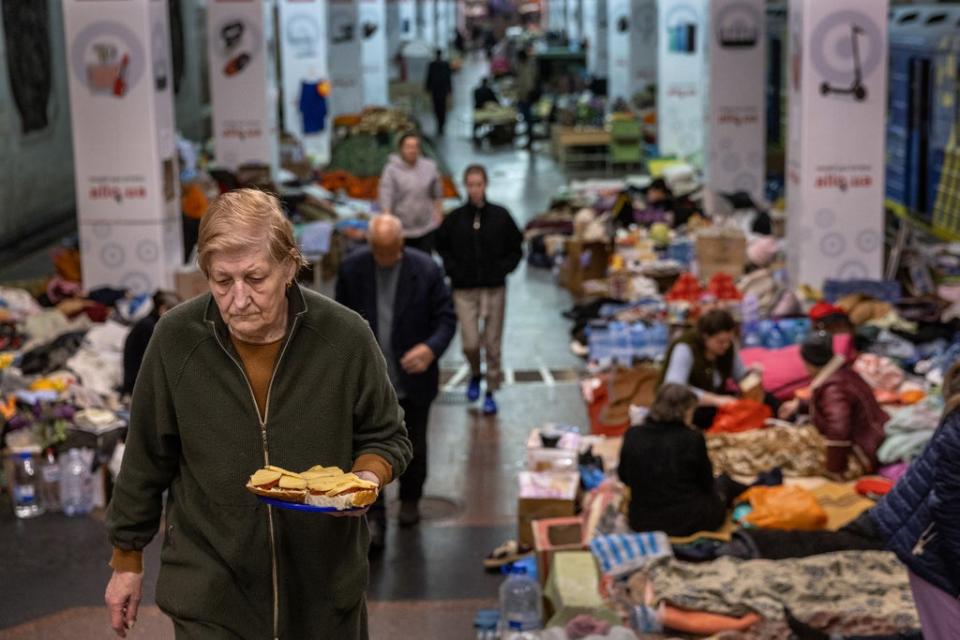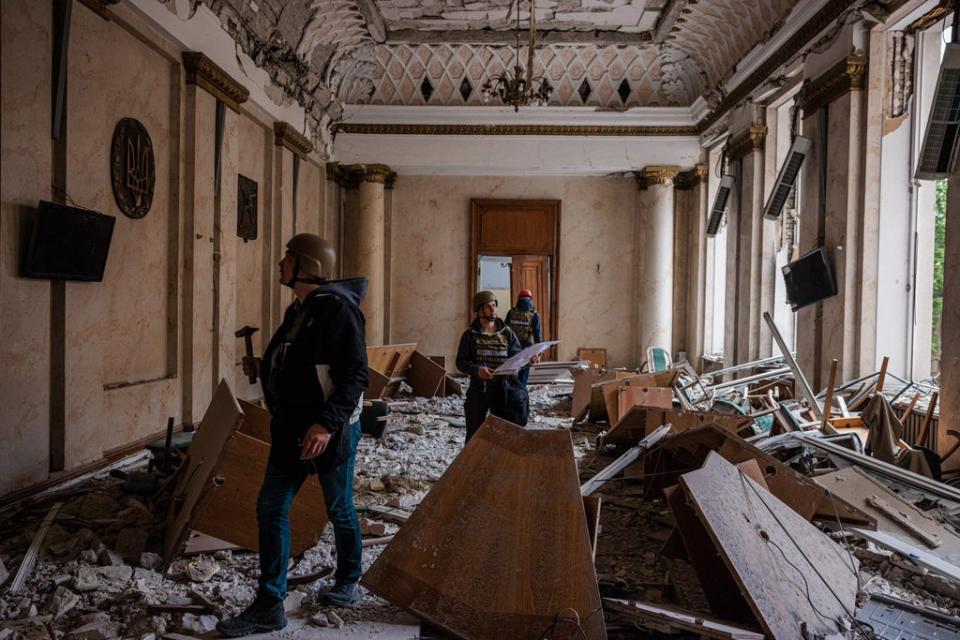The Battle for Kharkiv: How Ukraine’s second city was reclaimed from Russian forces

Attacks by Russian commando forces in the centre of Kharkiv were meant to lead to the capture of the city and pave the way for Vladimir Putin’s dismemberment of Ukraine.
It was expected that the Kremlin would seek to take over the country’s second-biggest city, which lies just 30 miles from the Russian border with 74 per cent of its 1.4 million inhabitants Russian-speaking, and supposedly with divided loyalties.
Ukraine’s president, Volodymyr Zelensky, predicted before the war began that the city would be seized under the pretext of “protecting” these people. And in 2014, pro-Moscow leader Viktor Yanukovych briefly planned to set up a base in Kharkiv after fleeing Kyiv following the Maidan protests. The city’s mayor, Ihor Terekhov, even acknowledged that “Kharkiv has always been considered more or less loyal to Russia”.
But 82 days after the 24 February invasion, Russian forces have been driven away from the city, changing the course of the invasion. It is one of the tragic ironies of Mr Putin’s “war of liberation” that two largely Russian-speaking cities, Mariupol and Kharkiv, have taken the worst pounding. And while Mariupol is likely to fall now that the last stand of Ukrainian forces at the Azovstal steelworks are being evacuated, what happened at Kharkiv is seen as a major strategic and symbolic blow for the Kremlin.
On Monday, Ukrainian forces reached the Russian border, where they sent a video of themselves gathered around a border post in the national blue and yellow colours telling President Zelensky: “We are here! We are at the border!”

And US officials have declared that Ukraine has “won the Battle of Kharkiv”. What is now unfolding in the city, said Nato secretary-general Jens Stoltenberg, adds to the growing belief that “Ukraine can win this war”. Admiral Sir Tony Radakin, the head of the British military, believes Ukraine’s independence is now guaranteed.
But some in the Ukrainian security forces caution against overconfidence. They have said Kharkiv and surrounding areas are still experiencing shelling, and lives are still being lost. There are also reports of Russian troop build-ups across the border in Belgograd. Some of those I met in Kharkiv during the long siege told me what had gone right and wrong during the campaign and what may follow.
Flawed intelligence
Shortcomings in Russian operations were exposed in the intial attacks into the city, on consecutive days, at the start of the war.
The first was by paratroopers flying in on helicopters. They came under heavy fire and were eventually forced to withdraw, taking the wounded, leaving dead bodies and losing at least one of aircraft.
The second, by a commando force of marines and Chechens, had been sent to take officials at the City Hall captive. But they arrived to find the building empty, and were themselves were caught in an ambush. The Russians retreated under fire, taking casualties on the way, before holing up in a school. A relief column was sent to rescue them, but was forced back, most of the troops at the school were killed or captured.
“What we discovered was that the intelligence the Russians had been given was faulty,” recalls Oleg Posohov, master sergeant of the volunteer Cossack Battalion, the 226th who took part in the fight on the day. “Those we captured said their orders were to grab officials, which had become standard Russian practice in this war, but they have been working from other locations as soon as the bombing began.
“We chased them and they ended up at the school. They really had no way out of there. There was another attack by helicopters, the helicopters came in with their guns firing. They landed and tried to take over buildings, it was a struggle, but we drove them off.”

Flawed intelligence has been consistent in this war. Before hostilities began, the British government announced that Yevhen Murayev, a former Ukrainian MP, had been picked by the Kremlin to be the leader of a puppet regime following an invasion. London got the “intelligence” on this from Washington.
The suggestion was met with widespread scepticism in Ukraine. As Mr Murayev delighted in pointing out, he was under sanctions from the Russian government after falling out with Viktor Medvedchuk, a businessman and politician close to Moscow, and whose daughter’s godfather is Mr Putin. Mr Medvechuk is currently under arrest in Ukraine.
“There’s evidence that some people were making a lot of money by selling information. They were telling people what they wanted to hear. That’s one of the reasons we think the Russians thought they had a lot of support in Ukraine”, said Colonel Oleg Rozghov, an intelligence officer. “There were also infiltrators giving information on military positions, we rounded them up pretty quickly, we are still doing that.”
There is also some circumstantial evidence that Russian intelligence agencies may have been competing against each other in backing pro-Moscow factions, claimed Captain Aleksandr Osadchy of the Cossack battalion. “We see the changes Putin is carrying out currently in the intelligence agencies running their Ukraine operation. That kind of rivalry helps us,” he said.
Relentless bombardment
After the failure of attempted surgical strikes, the Russians sent heavy armour into the city on 27 February. But again they were pushed back, with Javelin rocket systems provided by the US and NLAWs from the UK proving highly effective in close-quarter combat, according to Ukrainians who claimed six Russian tanks were destroyed in 24 hours. Charred remains of tanks and personnel carriers remain dotted around the city as a reminder of the strife.

There was another airborne assault on 2 March, when Russian paratroopers shelled buildings including the military hospital. But they were forced out having failed to hold ground; 21 people were killed and another 110 wounded on that day.
Having failed to make inroads, Russians began missile strikes, killing a dozen more civilians. Emergency services reported that 87 homes were destroyed, along with an electricity substation, cutting off power to much of the city.
Valentina Panchenka shuddered as she remembered the bombing. The 46-year-old teacher lived with her two sons and a daughter in Saltivka, which was to take a relentless hammering in the weeks to come.
“Everything shook when the rocket hit our buildings,” she said. “I thought the floor would collapse and we would just sink four floors. I could hear people screaming; the children were crying. I just gathered them and rushed out, and all the time rockets were hitting the buildings. One lady died and quite a few were wounded in our block. I saw one man with both his legs cut off.”
Ms Panchenka and her family managed to get to the Heroiv Pratsi metro station that became her home for the next nine weeks. Over time, a routine was established there. A clinic was set up, food was provided by welfare groups and religious organisations, and there were online lessons for children. There were even makeshift beauty parlours. With trains no longer running, tracks were used by those seeking shelter to walk between stations.
“It was still very frightening; we could hear the explosions every day, even underground. An old lady who went out to queue for food was killed when a supermarket got bombed,” said Oksana Kovaleva, who had sought refuge with her four children. Her husband, Anton, had joined the army.
Corruption and inefficiency
Captain Osadchy paused as he recalled the high number of civilian casualties, and spoke quietly of his mother’s death. Maria Osadchy, 85, was killed during the shelling of the village of Kamianka, at the home where her family had lived for generations. “She was a very determined woman and she wouldn’t change her mind. Like so many people of that generation, she had a tough life; it is such a pity it ended so sadly, so unnecessarily”, he said.

For the captain and his troops, the main aim was to keep defending Kharkiv while other forces were readied for a counteroffensive. But the death toll in the city continued to climb, with hundreds reportedly killed there by the end of the first month of the war.
At the underground headquarters of one of the busiest Ukrainian units in Kharkiv, soldiers hurriedly ate lunch before a mission behind enemy lines. Their commander, Oleg Supareka, had experience serving with Soviet forces, as he was deployed in the first Nagorno-Karabakh war in the Nineties.
“Judging by their poor performance in this war, not a lot has changed – there is a lot of corruption and inefficiency,” he said. “I maintained contact in the Russian military for a while, and they spent more time on ceremonial duties than on fighting practice and that shows in this war.”
Across the road, a building lies partly demolished by missiles. “That was meant to be us,” he said. “They have been trying for a while to hit our position; they are getting closer, we may have to move.” But even so, Russians have had some successes in hitting military targets, including two missile hits on the headquarters of the city’s territorial defence forces.
‘Such a great feeling’
Ukrainians also proved able to carry out targeted hits, including on Major General Vitaly Gerasimov, one of the highest-ranking Russian officers to be declared dead in the war. A Ukrainian officer said the general’s killing by a sniper took place with help from western intelligence. He later contacted me to insist he had made a mistake and there was no western involvement in the killing.
The tide really began turning at the end of April. The Russians had begun planning an assault on the Donbas now that Mr Putin’s total conquest of Ukraine was no longer feasible. Moscow maintained that taking the eastern territory had always been the real aim of the campaign.
On 29 April, the village of Ruska Lozova was retaken. On 6 May, Ukrainians launched a broad counteroffensive, recapturing Tsyrkuny, Peremoha and Cherkasi Tyshky.
“The main gain was that we pushed most of their artillery out of the range of hitting Kharkiv; that was a big relief,” said Major Nicolai Pavluyk, who serves in a volunteer brigade. “It was also such a great feeling to be on the front foot and making them retreat, getting back territory. In the past, we were blowing bridges to slow the Russians, now they are blowing bridges to try and delay us.”

“Expectations are very high now,” Captain Osadchy said. “If talks are held then Mr Zelensky needs to be careful what he offers the Russians, I don’t think the army will accept concessions, I don’t think the people will accept concessions.”
Destroyed legacy
With Kharkiv relatively safe for now, some people are raising questions about why the city was not prepared earlier. There are accusations that routes were left unsecured, and corners cut. Inquiries need to be held, some said. “People have lost members of their families, they have risked their lives, there are questions, they’ll want answers”, said Captain Osadchy.
Fighting continues in Izium, a nearby town that Russians want to take for the Donbas offensive. Many villages that have been under Russian occupation have been smashed in the ensuing combat. There have even been reports of executions and sexual abuse in these areas.
As well as the loss of life, the scale of destruction in Kharkiv is huge. But Kharkiv is standing and its people are, for now at least, united. Kiril Semenov, a Russian speaker, said on a previous visit that he would “never take up arms against our Russian brothers”. Instead, the 48-year-old engineer became a volunteer, ferrying supplies and food to Ukrainian forces. “Putin bombed us into realising how Ukrainian we are,” he said.


